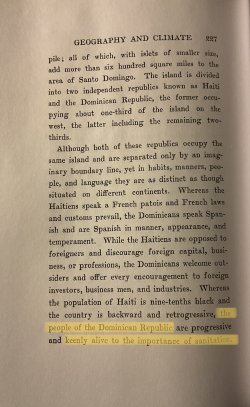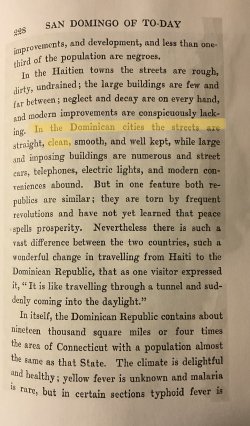The thing that astounds me most is why the Dominicans do not respect their environment.
Even near their own home they dump or ignore trash.
Seems a shame as it could be a much more majestic place with little effort.
Depends on the place. In many towns and campos the streets and public outdoor places are quite clean. In those places people include the cleanliness of the place as part of their pride. These places tend not to be near tourist areas (they themselves tend to be clean, but the government makes an effort of creating that for the sake of the tourists. Elsewhere it really depends on the residents and their habits).
It wasn't always like that. At first it may seem that during the Trujillo Era Dominican towns and rural areas were spotless because of Trujillo (Santo Domingo was considered one of the cleanest cities in Latin America), but then there are things as the following which predates the Trujillo Era.
This is how Alpheus Hyatt Verril describes the DR in 1914 (a trip that included traveling through much of Puerto Rico, the DR, and Haiti).


Before Trujillo was born Samuel Hazard in his "Santo Domingo Past and Present and A Glance at Haiti" never mentions the sanitation issue of the DR (Santo Domingo is the country, not just the capital) and he traversed much of it, but he does mention that Port-au-Prince is "the Paris of the gutter" and that the only times the streets are cleaned is when it rains strong enough to flood them and form torrents of water towards the bay. This was in 1871 and both are based on his eyewitness through a much more thorough traveling through the DR while the parts of Haiti that he visited were Cap Haitien and vicinity, Port-au-Prince and vicinity, and Gonaives. He visited those three Haitian towns because the steamer heading from the DR to NY stop in those three ports prior to starting the sea route to NYC. He also mentions how the steamer would glide off the coast of Haiti and all they would see are "verdure clad mountains" and a natural "beauty in the extreme." When he toured the outer area of Port-au-Prince he mentions how the forests covered the mountains, but along the rivers their was many logs from cut trees floating to town, presumably to ship them abroad and sell them.
Anyway, the DR garbage problem is something that appears in modern times. Reading accounts from not too long ago all the way to colonial times, the cleanliness of the streets wasn't an issue. Ironically, when it comes to Haiti, accounts mentioning the garbsge problem appears almost as soon as it became an independent country.



